Examining the Oil Industry’s Efforts to Suppress the Truth about Climate Change
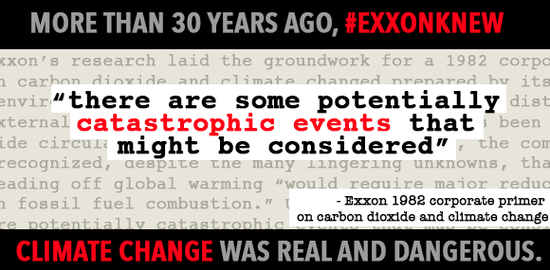 The Subcommittee will examine how the oil industry’s climate denial campaign has negatively and disproportionately affected people of color and vulnerable populations in our country and around the world, as well as drowned out the voices of everyday Americans.
The Subcommittee will examine how the oil industry’s climate denial campaign has negatively and disproportionately affected people of color and vulnerable populations in our country and around the world, as well as drowned out the voices of everyday Americans.
BACKGROUND
Decades of climate denialism by the oil industry forestalled meaningful government action to avert the current crisis. As early as the 1960s, oil giants like Exxon knew that climate change was real and that the burning of fossil fuels was a major contributor to the problem.
The lack of government action on climate change has a disproportionate impact on vulnerable communities who are often harmed “first and worst” by climate change.
Climate denial not only led to these devasting effects on vulnerable populations; it also represents a distortion of our democracy, as powerful, moneyed interests control the conversation and drown out the voices of average Americans who are paying the price of climate change.
Despite efforts to rehabilitate their image by pledging to stop supporting think tanks and lobbyists who promote climate denialism, Exxon has continued to fund climate deniers. Exxon still continues to fund organizations “steeped in climate denial and delay” to this day, clear evidence that it has not changed since its initial pivot from climate science to denial.
Despite the already devasting effects of climate change, Exxon shows no signs of slowing down on its production of fossil fuels. To the contrary, Exxon and other oil companies continue to explore for more oil, meaning they are not taking the problem of climate change or the development of alternative fuels seriously.
Witnesses:- Dr. Mustafa Ali, Vice President, Environmental Justice Climate and Community Revitalization, National Wildlife Federation
- Dr. Ed Garvey, Former Exxon Scientist
- Dr. Martin Hoffert, Former Exxon Consultant, Professor Emeritus, Physics, New York University
- Dr. Naomi Oreskes, Professor, History of Science, Affiliated Professor, Earth and Planetary Sciences, Harvard University
- Sharon Eubanks, Esquire, Of Counsel, Henderson Law Firm, PLLC
Shut Down DC – Global Climate Strike 2019
Youth leaders from around the world have called for a climate strike and global week of action from September 20th-27th. They have been taking the lead so far, but now they are calling on all of us to take action. In Washington, DC we will be answering the call and building on the momentum of the youth climate strikes in a major way:
On September 23rd, we are going to shut down DC.
We will block key infrastructure to stop business-as-usual, bringing the whole city to a gridlocked standstill. Parents, workers, college students, and everyone who is concerned about the climate crisis will skip work and school and put off their other responsibilities to take action on the climate crisis.
We won’t tolerate delay and inaction any longer. We are ready to take the fight for climate justice to the next level. Sign the pledge and join us.
Sign the Climate Strike DC Pledge of Resistance here.
___
In August of 2018, Greta Thunberg began striking from school every Friday, choosing instead to sit in front of the Swedish parliament in protest. Within months, the movement had gone global, with hundreds of thousands of students across the globe refusing to go to school on Fridays. Now, we must all follow the example set by the brave youth and do everything in our power to preserve a habitable planet.
There’s no time left for business-as-usual. The climate crisis is here. People around the world are experiencing superstorms, floods, droughts, and wildfires at unprecedented rates. Millions of people are seeing their lives and livelihoods transformed by environmental changes and hundreds of thousands have been pushed from their homes, forced to make long and dangerous journeys across borders in search of safety and security.
If we do not build up the political power to force the government to take substantive action on climate within the next 18 months, it could very well be too late for us to stop the worst effects of climate breakdown. We must rise up in this moment, take bold action, shut down the nation’s capital, and make it impossible for our leaders to continue to ignore us.
To achieve something as monumental as shutting down DC, we are going to need everyone to step up. We need everyone’s creativity, everyone’s energy, everyone’s insights, and everyone’s ideas. Every single person has skills and experience to contribute to the strike.
We do not take this action lightly. We know that this shutdown will cause massive disruption to people who bear no responsibility for the climate catastrophe we are facing. But we will also cause massive disruption for politicians, huge corporations, and the lobbyists who control our government. We need to fundamentally change the power structure of the United States if we want to stop the climate crisis. Shutting down DC is a huge step in the right direction.
This is the mass uprising that everyone with climate anxiety has been waiting for. This is an uprising for life itself, fighting back against the forces of destruction. This is your chance to take action to save the people, plants, and animals you love. Let’s rise to the challenge and shut down DC!
The Interfaith Climate Strike Procession starts from Luther Place Memorial Church and moving west on K street (more details to come). We will gather at 9:30 am with an official send off at 10:00am.
Press Conference for House Resolution Encouraging Teaching about Climate Change in Schools
Congresswoman Barbara Lee (D-CA) will introduce a House Resolution in support of teaching climate change in schools on Thursday, September 19th, 2019. A press conference will be held beforehand at 11:00 am at the U.S. House Triangle. Rep. Debbie Dingell (D-MI) will be speak about her support for the resolution and the urgency of addressing climate chance. Other members of Congress have also been invited.
Youth climate advocates Jonah Gottlieb (National Children’s Campaign), Kate Roney and Christian Hernandez (Schools for Climate Action), and an educator, Nancy Metzger-Carter (Sonoma Academy, UN Climate Change Teacher Academy) will also speak in support of the resolution.
Representative Lee worked with youth and teacher climate advocates to craft a House Resolution supporting the teaching of climate change in schools because “the global impact of climate change and the urgency and magnitude of the challenge of addressing climate change will eventually fall on current students.”
The House Resolution declares climate change a social justice, racial justice, and human rights issue that disproportionately affects students of color and students in poverty, thereby exacerbating existing inequalities and limiting equality of opportunity. It also refers to a 2019 resolution by the California Association of School Psychologists that declared climate change a potential threat to the psychological and social development of children, in addition to known negative health effects.
One of the lead groups that collaborated with Rep. Lee was Schools for Climate Action, an initiative of the National Children’s Campaign, is a nonpartisan, youth-adult campaign that helps school boards, students councils and educational sector organizations pass climate resolutions calling on Congress to act and bringing awareness that climate change a generational justice issue.
The resolution has been endorsed by: The National Children’s Campaign, Schools for Climate Action, Global Oneness Project, National Association of Geoscience Teachers, National Center for Science Education, Principles for Responsibility Investment, Paleontological Research Institution, Rethinking Schools, Sierra Club and Teacher’s Advocacy Committee.
National Children’s Campaign
National Children’s Campaign advocates on behalf of the nation’s 74 million children. It is a national, nonpartisan, nonprofit organization to serve as a catalyst to inspire, encourage and empower to make America’s children & youth a national priority by promoting health, education, safety, economic & environmental security through the power of strategic media and internet partnerships, experts, business and community leaders, celebrity spokespeople and grassroots effort.
Schools for Climate Action
Schools for Climate Action, A nonpartisan youth/adult campaign that works with the educational sector to pass climate resolutions that declare climate change as a generational justice issue and call on Congress to act.
#ShutDownDC for Climate Justice: Featuring Naomi Klein, Rev Yearwood
Climate change might well be the greatest danger to the survival of humanity, that we have ever faced. Indigenous peoples, and Black and Brown communities on the frontlines of the interlinked economic, democratic and climate crises, have been leading the resistance to extraction and pollution, fighting to protect Mother Earth, by centering traditional ecological and cultural knowledge and creating pathways for a regenerative future. Students and young people have always been on the forefront in the struggle for climate justice.
Youth leaders from around the world have called for a climate strike and global week of action from September 20th-27th. They have been taking the lead so far, but now they are calling on all of us to take action. In Washington, DC we will be answering the call and building on the momentum of the youth climate strikes in a major way:
On September 23rd, we are going to shut down DC.
Friends Meeting House• 2111 Florida Ave NW
Pushed By Climate Activists, New York Times Abandons Oil And Money Conference
 The New York Times has dropped its long-running sponsorship of its highly lucrative Oil And Money conference, ceding to rising pressure from climate activists. The decision was announced on Twitter by the New York Times Climate team led by editor Hannah Fairfield. The tweet included a statement from the Times’ communications SVP, Eileen Murphy:
The New York Times has dropped its long-running sponsorship of its highly lucrative Oil And Money conference, ceding to rising pressure from climate activists. The decision was announced on Twitter by the New York Times Climate team led by editor Hannah Fairfield. The tweet included a statement from the Times’ communications SVP, Eileen Murphy:
The New York Times has decided to end its relationship with the Oil & Money conference.Over the last several years The Times has significantly expanded its reporting on climate change and its impact, as well as broader investigative and explanatory coverage of energy and environmental policy. We have a large team focused solely on the topic and in the last year alone we’ve traveled to every continent to document the effects of a warming planet.
While our partners in Oil & Money, Energy Intelligence, have always maintained high standards of independence and impartiality, the subject matter of the conference gives us cause for concern as we continue to invest in these consequential environmental issues. We want there to be no question of our independence or even the potential appearance of a conflict of interest.
We wish Energy Intelligence well as they continue to gather energy leaders, policy makers, and environmentalists to discuss how to sustainably meet the world’s rising energy needs.
The tweet, like much of The Times’ climate coverage even to this day, avoided directly stating that the fossil-fuel industry causes global warming.
Separately, Energy Intelligence announced the conference will be “renamed the Energy Intelligence Forum” because “the energy industry is changing, and as our conference program has evolved in recent years to address the challenges of climate change and the energy transition, we felt that our conference needed a new identity and a new mandate.”
The London-based conference, which gathers the world’s top oil executives, has been the target of protests for years. In 2014, climate activist Tamsin Ormond stormed the conference, shouting “Oil is fucking our future!”In 2015, members of Fossil Free London (@DivestLondon) staged a protest outside the conference, holding the banner “Climate Change: No Time To Party”:
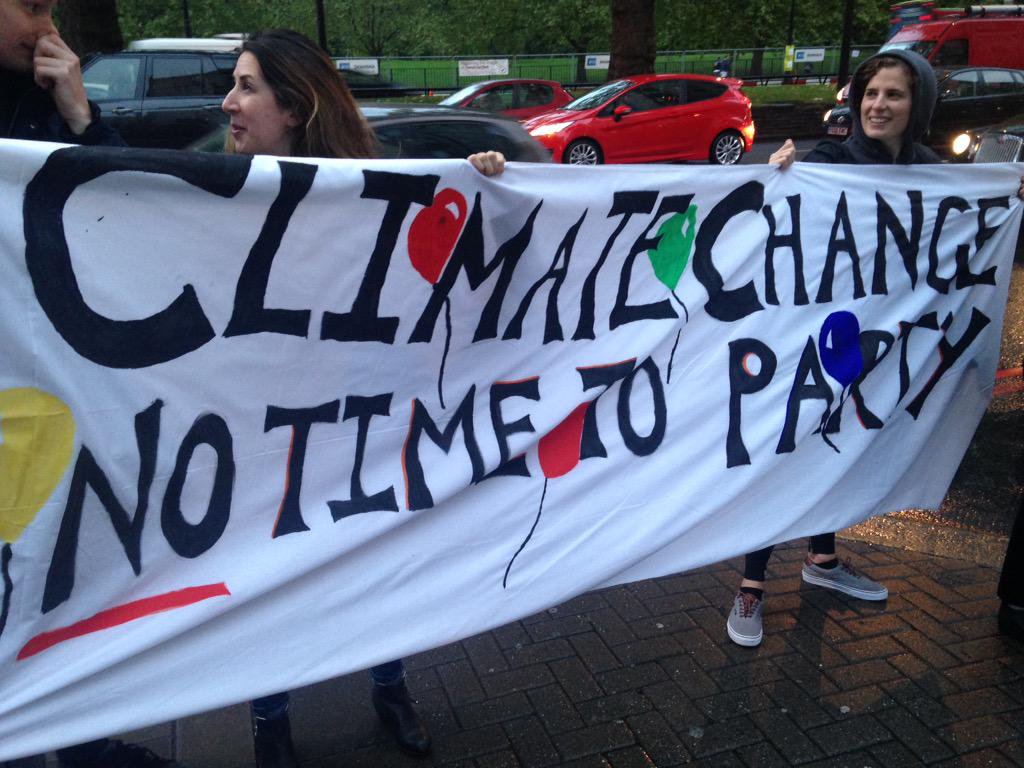 and blocking the award ceremony celebrating ExxonMobil CEO Rex Tillerson:
and blocking the award ceremony celebrating ExxonMobil CEO Rex Tillerson:
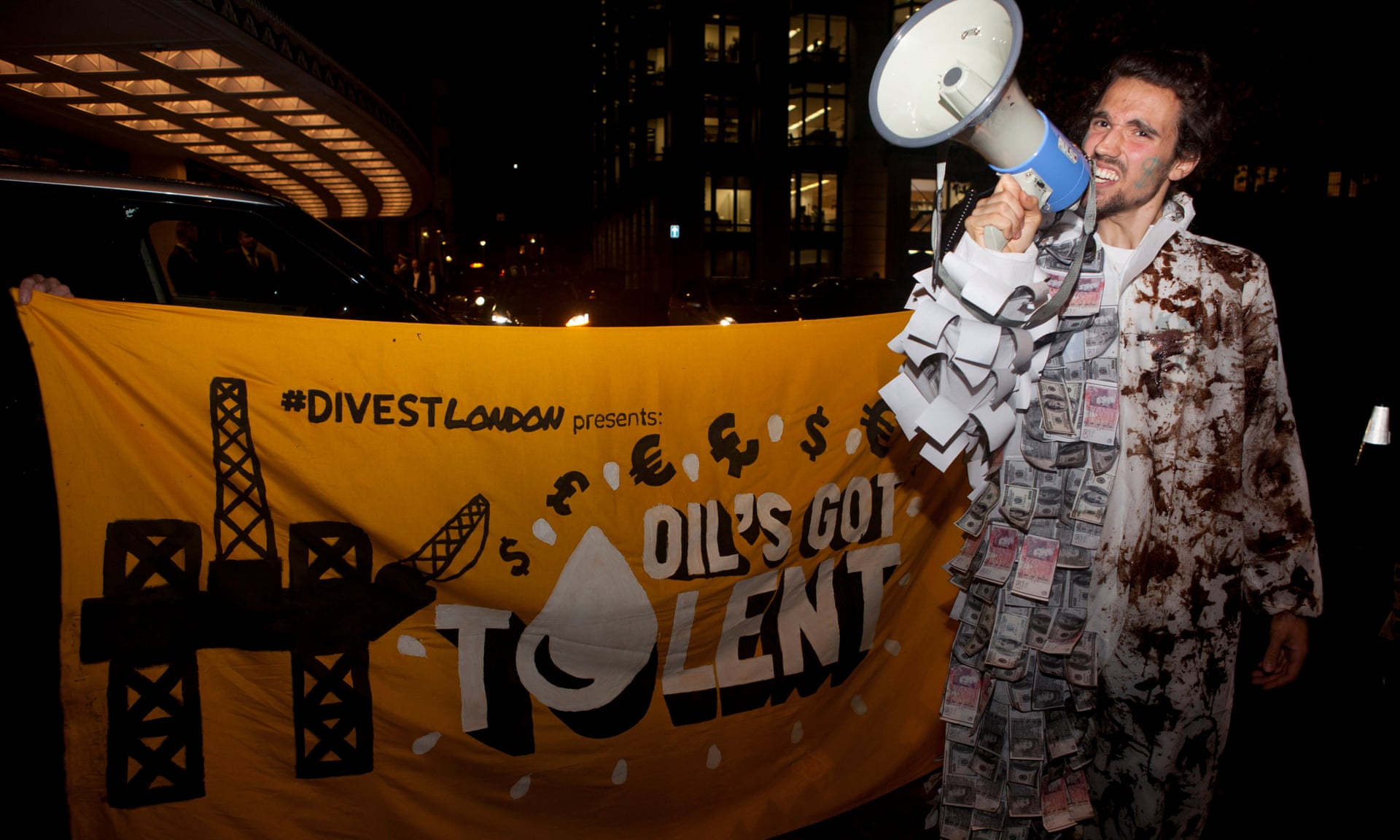 The protesters mockingly threw cash at the executives as they entered the “Petroleum Executive of the Year” gala:
The protesters mockingly threw cash at the executives as they entered the “Petroleum Executive of the Year” gala:
 Two of the protesters superglued their hands to the doors of a side entrance, and others tried to infiltrate the gala.
Two of the protesters superglued their hands to the doors of a side entrance, and others tried to infiltrate the gala.
In 2016, the Divest London protests continued, with activists declaring a “Climate Crime Scene”:
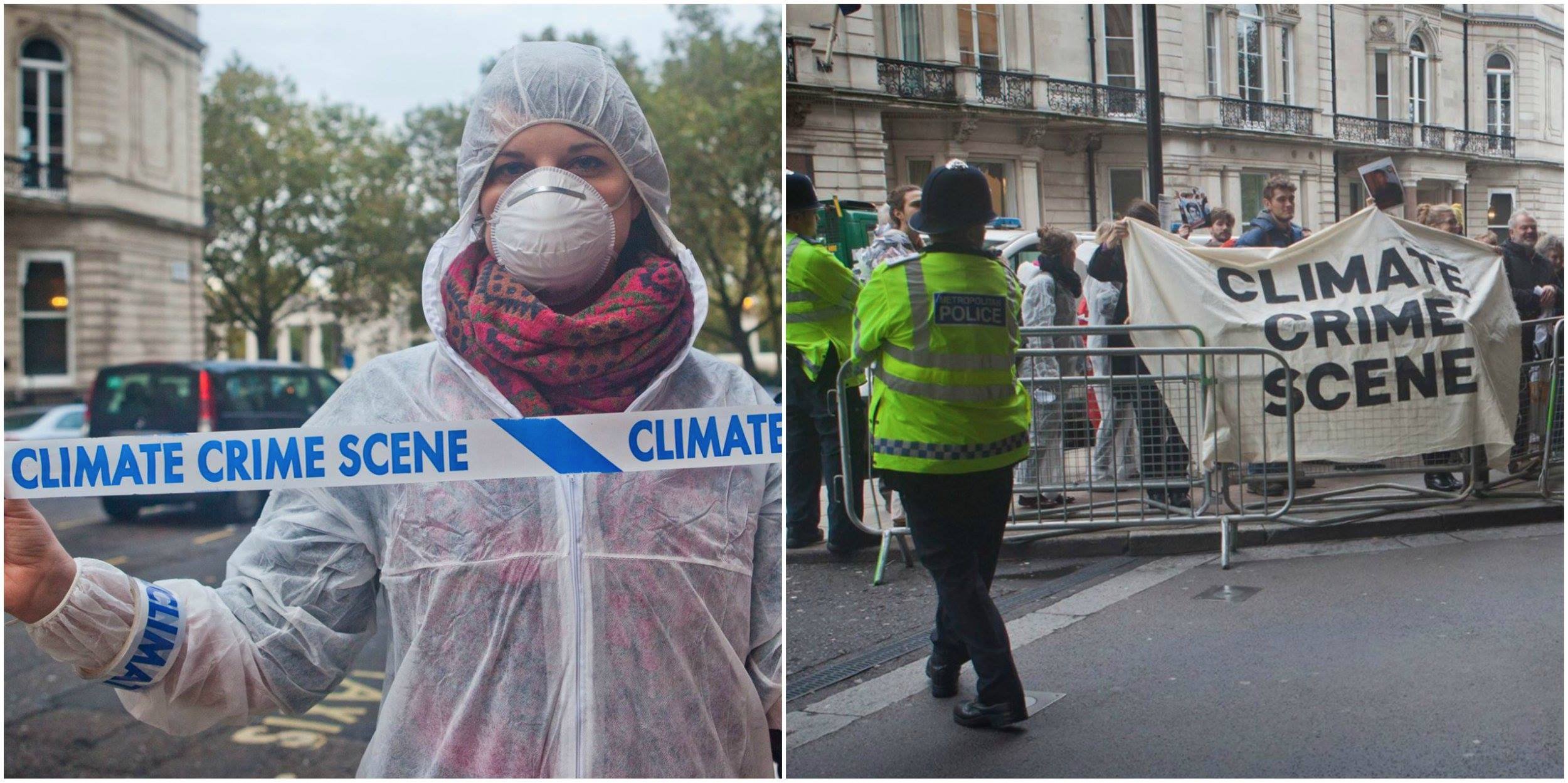
The protests at the conference continued in 2017 and 2019.
In June 2019, Extinction Rebellion staged sit-in protests at The New York Times headquarters in Manhattan, blocking traffic on Eighth Avenue and scaling the NYT building with a large “Climate Emergency – Mass Murder” banner:
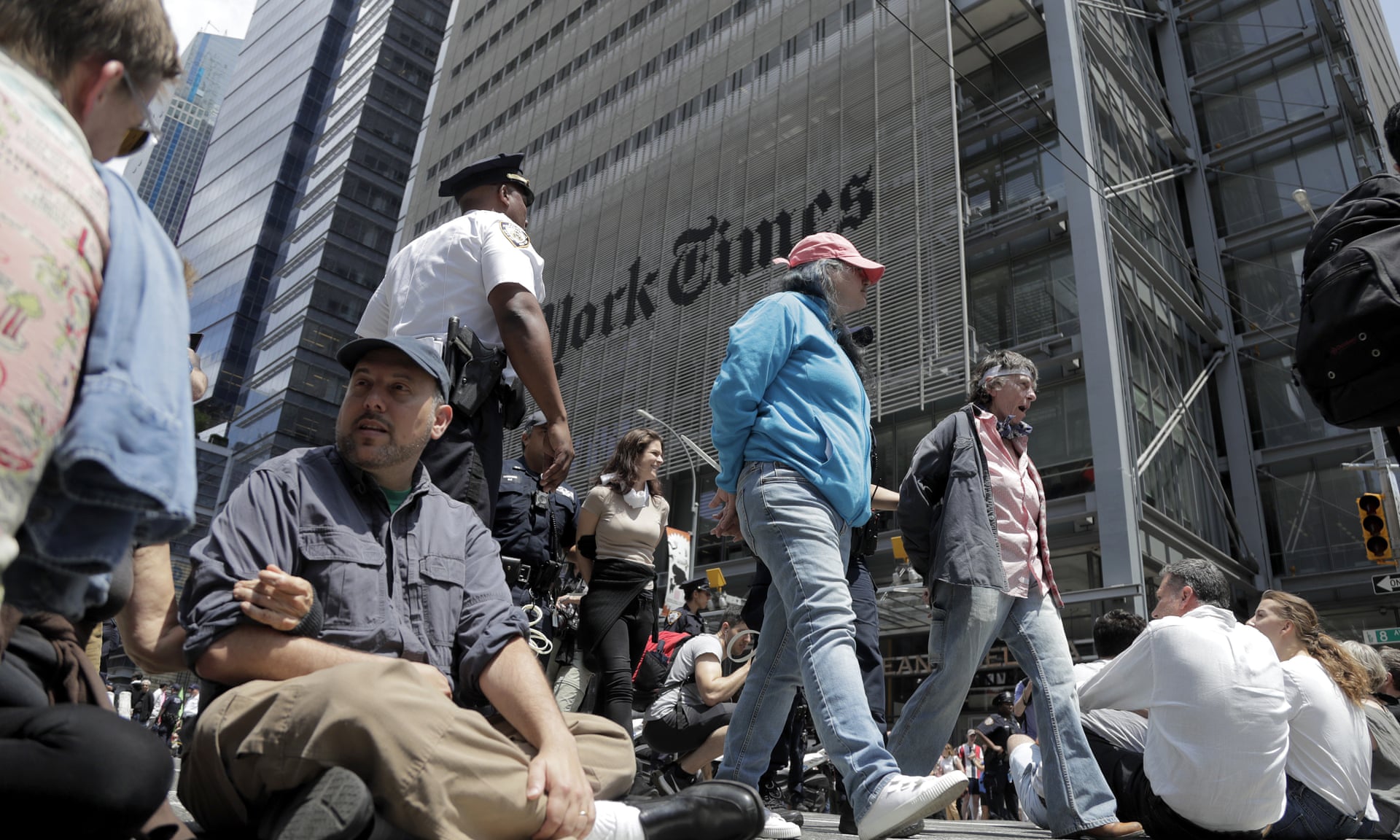 About 70 protesters were arrested.
About 70 protesters were arrested.
At the time, The Guardian’s Amanda Holpuch reported that The New York Times responded: “There is no national news organization that devotes more time, staff or resources to producing deeply reported coverage to help readers understand climate change than The New York Times.”
The New York Times did not report on the protest, which was covered by many other outlets.
The June protest focused on the tenor of The New York Times’ climate coverage and its acceptance of fossil-fuel advertising, not its sponsorship of the Oil & Money Conference. However, Extinction Rebellion NYC soon began to focus on the Oil & Money Conference, including it as a target in their August 7th die-in at Times headquarters and in an August 30 video appeal to the Times.
As DNC Votes to Kill Climate Debate, Biden Campaign Rescinds Support
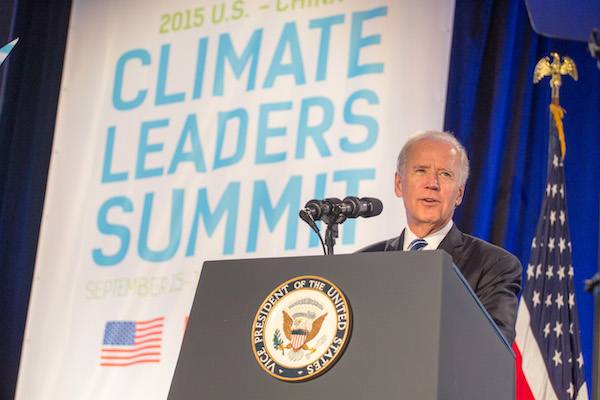 On Thursday, the Democratic National Committee’s resolutions committee voted down a resolution that would have established a climate debate for the presidential candidates, reflecting the wishes of frontrunner Joe Biden. However, the committee did open the door to candidates participating in a non-DNC-sanctioned climate debate, a significant victory for the youth activists leading the call. On Saturday, the full DNC voted that plan down 222 to 137, closing the door to any presidential climate debate.
On Thursday, the Democratic National Committee’s resolutions committee voted down a resolution that would have established a climate debate for the presidential candidates, reflecting the wishes of frontrunner Joe Biden. However, the committee did open the door to candidates participating in a non-DNC-sanctioned climate debate, a significant victory for the youth activists leading the call. On Saturday, the full DNC voted that plan down 222 to 137, closing the door to any presidential climate debate.
DNC chair Tom Perez’s resolution to block a DNC climate debate passed the committee in an 17 to 8 vote.
At the DNC meeting in California, Biden spokesperson and DNC member Symone Sanders said it would be “dangerous” to hold a climate debate.
Mercury News’s Casey Tolan reported that Symone Sanders said a climate debate “would fundamentally change the game” of the established debate rules and would be “dangerous territory in the middle of a Democratic primary process.”
In June, Biden had expressed unequivocal support for a debate exclusively on climate.
DNC members opposed to holding a climate debate include corporate lobbyist and CNN commentator Maria Cardona of the Dewey Square Group, who said “It will take away time from their knocking on doors, going to all of your states to be able to campaign.”
DNC Chair Tom Perez Files Resolution To Kill Climate Debate
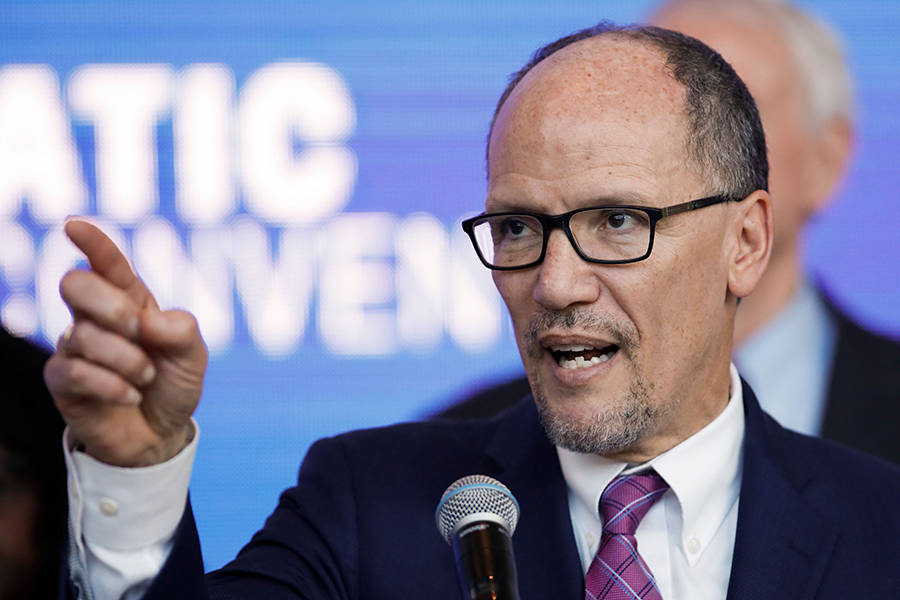 With the August 22nd meeting of the Democratic National Committee fast approaching, DNC chair Tom Perez has filed a resolution to block the establishment of a Democratic presidential debate focused on climate change. Spurred by youth climate activists, nearly every candidate supports such a debate.
With the August 22nd meeting of the Democratic National Committee fast approaching, DNC chair Tom Perez has filed a resolution to block the establishment of a Democratic presidential debate focused on climate change. Spurred by youth climate activists, nearly every candidate supports such a debate.
The Perez resolution argues that the climate town-hall forums scheduled by CNN and MSNBC for September, in which candidates would be interviewed separately, are a sufficient substitute for a debate.
The resolution concludes:WHEREAS, Democratic candidates for President of the United States are demonstrating their commitment to tackling the issue of climate change, having already scheduled two televised forums on CNN and MSNBC to discuss the issue, and debating the issue during each of the DNC-sanctioned presidential primary debates;THEREFORE BE IT RESOLVED THAT, Democrats will address the serious threat of climate change through bold and inclusive solutions that grow the clean energy economy and expand America’s middle class.
Perez was backed by Barack Obama to block environmental-justice leader Keith Ellison from becoming chair.
The full text of the resolution is below:
The following Resolution will be considered by the Resolutions Committee at its meeting in San Francisco, CA on August 22, 2019.Submitted by: Tom Perez, DNC Chair/Maryland
Resolution Recommitting the Democratic Party to the Work of Combating Climate Change and Creating Jobs by Growing our Clean Energy Economy
WHEREAS, Democrats recognize that climate change is a present, urgent, and growing threat to our economy, our national security, and our future; and
WHEREAS, fighting climate change is both a moral imperative and one of the biggest economic opportunities of our time; and
WHEREAS, workers, communities of color and low-income Americans suffer disproportionately from environmental degradation and climate change; and
WHEREAS, the Trump administration and many Republican lawmakers continue to roll back essential protections for our environment, climate, and public health; and
WHEREAS, President Trump betrayed American workers when he pulled out of the Paris Agreement; and
WHEREAS, Trump promised voters that he would be “the greatest jobs president God ever created!’ and instead opened the door for China to create millions of clean energy jobs that would have otherwise been based in the United States; and
WHEREAS, Trump installed a former coal lobbyist as head of the Environmental Protection Agency; and
WHEREAS, we must protect our planet from the threat of climate change while creating good jobs, raising labor standards, and organizing in clean energy sectors; and
WHEREAS, Democrats are committed to addressing the impact climate change can have on workers, families, and entire communities, while putting millions of Americans hack to work in load-paying union jobs that provide high wages, secure retirements, and safe workplaces: and
WHEREAS, Democratic candidates for President of the United States are demonstrating their commitment to tackling the issue of climate change, having already scheduled two televised forums on CNN and MSNBC to discuss the issue, and debating the issue during each of the DNC-sanctioned presidential primary debates;
THEREFORE BE IT RESOLVED THAT, Democrats will address the serious threat of climate change through bold and inclusive solutions that grow the clean energy economy and expand America’s middle class.
Environmental Organizations Cross Racial Divides To Present Climate Justice Platform
In an encouraging sign for those seeking to make the vision of the Green New Deal a reality, a coalition of mostly white environmental organizations and predominantly black environmental justice organizations have released the “Equitable & Just National Climate Platform.”
The platform is a vision statement for American climate justice policy, with signatories “committed to advancing a bold and equitable national climate agenda and believe that all people and all communities have the right to breathe clean air, live free of dangerous levels of toxic pollution, access healthy food, and share the benefits of a prosperous and vibrant clean economy.”
The Sierra Club, League of Conservation Voters, Natural Resources Defense Council, and Union of Concerned Scientists are also members of the BlueGreen Alliance which released a similar labor-focused platform in June.
Platform co-authors and inaugural signatories: Center for American Progress, Center for Earth, Energy and Democracy, Center for the Urban Environment, John S. Watson Institute for Public Policy, Thomas Edison State University, Deep South Center for Environmental Justice, Earthjustice, Environmental Justice Health Alliance for Chemical Policy Reform, Harambee House–Citizens for Environmental Justice, League of Conservation Voters, Little Village Environmental Justice Organization, Los Jardines Institute, Michigan Environmental Justice Coalition, Midwest Environmental Justice Network, Natural Resources Defense Council, New Jersey Environmental Justice Alliance, ReGenesis Project, Sierra Club, Tishman Environment and Design Center at the New School, Union of Concerned Scientists, WE ACT for Environmental Justice.
Environmental justice organization inaugural signatories: 2BRIDGE CDX / BTB Coalition, Agricultura Cooperative Network, Alaska Community Action on Toxics, Black Environmental Collective-Pittsburgh, Black Millennials 4 Flint, Black Youth Leadership Development Institute, Center on Race, Poverty and the Environment, Citizens for Melia, Clean Power Lake County, Coalition of Community Organizations, Community Housing and Empowerment Connections, Community Members for Environmental Justice, Concerned Citizens Coalition of Long Branch, Concerned Citizens of Wagon Mound and Mora County, Connecticut Coalition for Environmental Justice, Dakota Wicohan, Delaware Concerned Residents for Environmental Justice, Dr. Cesar G. Abarca, Dr. Fatemeh Shafiei, Dr. Marisol Ruiz, Dr. Robert Bullard, East Michigan Environmental Action Council, Eduardo Aguiar, El Chante: Casa de Cultura, Farmworker Association of Florida, Flint Rising, Georgia Statewide Network for Environmental Justice and Equity, Greater Newark Conservancy, Green Door Initiative, Greenfaith, Ironbound Community Corporation, Jesus People Against Pollution, Las Pistoleras Instituto Cultural de Arte, Lenape Indian Tribe of Delaware, Louisiana Democracy Project, Minority Workforce Development Coalition, Mossville Community in Action, Native Justice Coalition, Organizacion en California de Lideres Campesinas, Inc., Partnership for Southern Equity, People Concerned About Chemical Safety, People for Community Recovery, PODER, Reverend Canon Lloyd S. Casson, Rubbertown Emergency ACTion, Tallahassee Food Network, Texas Coalition of Black Democrats, Texas Drought Project, Texas Environmental Justice Advocacy Services, The Wise Choice, Inc., Tradish “Traditional Real Foods,” Tusconians for a Clean Environment, UrbanKind Institute, We the People of Detroit, West County Toxics Coalition, Wisconsin Green Muslims.
Download Equitable & Just National Climate Platform or read the text below:
AN EQUITABLE AND JUST NATIONAL CLIMATE AGENDA
To effectively build an inclusive, just, and clean-energy economy, the national climate agenda must achieve the following:
No community left behind
All communities have a right to live free from exposure to dangerous toxic pollution in their soil as well as in the air they breathe, the food they eat, and the water they drink. Yet persistent racial and economic inequalities—and the forces that cause them—embedded throughout our society have concentrated toxic polluters near and within communities of color, tribal communities, and low-income communities. These underlying social forces, including persistent and systematic racial discrimination and economic inequality, have created disproportionately high environmental and public health risks in these areas relative to wealthier white neighborhoods. The national climate policy agenda must address this environmental injustice head-on by prioritizing climate solutions and other policies that also reduce pollution in these legacy communities at the scale needed to significantly improve their public health and quality of life. The agenda must also build the U.S. Environmental Protection Agency to fulfill its mission to protect the nation’s health and the environment by developing and enforcing effective regulations for all communities.
A healthy climate and air quality
The devastating and costly consequences of climate change threaten the health, safety, and livelihoods of people across the country. Generations of economic and social injustice have put communities on the frontlines of climate change effects. The national climate policy agenda must have as its foundation policies that reduce greenhouse gas emissions and locally harmful air pollution at the ambitious scale and speed needed to avoid the worst and most costly health impacts, especially for the most vulnerable communities and communities coping with the legacy pollution from the present economy. This includes reducing emissions in low-income areas and communities of color—EJ communities—through a suite of policies, including climate mitigation policy. The agenda must mobilize vast new resources to reduce carbon pollution, curb locally harmful pollution, and build resilience to improve the health, safety, and livability of all communities in a climate-changed world.
Reduction in cumulative impacts
History shows that environmental regulation does not necessarily mean healthy environments for all communities. Many communities suffer from the cumulative effects of multiple pollution sources. A national climate policy agenda that addresses climate pollution must not abandon or diminish the important goal of reducing toxic pollution in all its forms. Climate solutions must be part of a comprehensive approach to reducing legacy environmental and economic impacts on communities and be designed intentionally to ensure that they do not impose further risks. Strategies to address climate change must not disproportionately benefit some communities while imposing costs on others. In fact, the national climate policy agenda should be used to reduce the disproportionate amount of pollution that is often found in EJ communities and that is associated with cumulative impacts, public health risks, and other persistent challenges.
An inclusive, just, and pollution-free energy economy
The shift to a sustainable, just, and equitable energy future requires innovative forms of investment and governance that distribute the benefits of this transition equitably and justly. This includes investing in the development of innovative decentralized models of energy provision; community governance and ownership; incorporation of social and health benefits into energy systems planning; incentivizing the inclusion of equity into future energy investment through public programs; and supporting public and private research and development to include equity considerations in new technology development.
The national climate policy agenda must drive a rapid shift toward a pollution-free, inclusive, and just economy as well as create high-quality jobs with family-sustaining wages and safe and healthy working conditions. Breaking down the barriers that produce unemployment and underemployment must be a priority. Workers must be treated fairly and supported through investments in workforce and job training programs, especially in communities with disproportionately high underemployed and unemployed populations and in communities that have been historically reliant on fossil fuel extraction and energy production.
Access to affordable energy
The national climate policy agenda must significantly reduce domestic energy vulnerability and poverty by addressing the problem of high energy cost burdens. To live and prosper in today’s society, access to affordable, reliable, and sustainable energy is a basic need in daily life and fundamental to achieving rights related to health, environmental quality, education, and food and income security. Given the disparities in the housing stock and infrastructure across communities, it is imperative that future energy systems provide affordable energy access that ensures a healthy standard of living that provides for the basic needs of children and families. The nation needs bold new leadership that will ensure access to sustainable energy, including by supporting investments in cooperative and nonprofit energy organizations; community and stakeholder engagement and participation in energy planning; public-private partnerships; and renewable and energy efficiency demonstration projects in our most vulnerable communities.
A healthy transportation and goods movement system
As a major contributor to climate and air pollution, we must build the next century’s transportation system to ensure healthy air quality for all communities. This will require massive investment in affordable, reliable, and environmentally sustainable transportation. As with other sectors, the transportation system has a direct effect on economic and social opportunities. Public resources and planning decisions affect patterns of urban development and the structure of local economies, including where jobs and employment are located. The transportation sector is also responsible for providing accessibility to basic human needs. Therefore, transportation planning must ensure affordable transportation that provides for community members’ mobility and access to daily activities and services, including jobs, education, health care, affordable housing, and social networks.
Clean and affordable energy and transportation through an increased and appropriate level of new federal investment in zero-emissions transportation options for all community members in both rural and urban areas must be a priority. This includes programs to scale up investment in public transit; zero-emissions transit buses, diesel trucks, and school buses; and accessible and affordable adoption of electric cars. We also need smart planning that will make our communities safe for pedestrian and bicycle travel.
The goods movement system that distributes raw materials and consumer products currently relies on diesel engines that produce emissions that have significant health and environmental effects on workers and members of surrounding communities. A national climate policy agenda must reduce pollution by advancing a zero-emissions goods movement transportation system to protect the health of workers as well as fenceline and frontline communities and ensure that they benefit from new clean transportation technology development.
Safe, healthy communities and infrastructure
Climate change exacerbates existing vulnerabilities and creates new risks in our communities. As a result, climate change presents historic challenges to human health and our quality of life. Communities across the country need a national climate policy agenda that will mobilize the massive investments necessary to prepare for climate change impacts. Climate solutions provide opportunities for localized benefits that enhance the quality of life for all communities, including by improving local air quality, access to healthy food, local economic development, public health, and community vitality.
We need to build housing and infrastructure that can withstand more powerful storms, floods, heat waves, cold snaps, and wildfires; reduce carbon and air pollution in areas with high cumulative pollution; build a more sustainable food and agricultural system; and expand access to family-sustaining jobs and other economic opportunities. As climate change deteriorates air quality, increases vector-borne disease and allergens, and contributes to a host of other public health threats, we must ensure full access to health care for all. The national climate policy agenda must prioritize investments in communities that are the most vulnerable to climate change, including in health monitoring and research to provide rigorous and reliable research on our progress.
Economic diversity and community wealth building
A national climate policy agenda must acknowledge the continuing increase in wealth and income inequality that plagues our communities. This growing wealth gap makes inclusive local economic development a priority for communities and governments. Economic diversification is critical to effectively address climate change and reduce economic and social vulnerability. We must create and support strategies that shift away from high pollution products and production processes toward those that are low-emission and sustainable. This also includes investments in innovative and worker-supported economic organizations such as cooperatives and other community wealth-building strategies.
Anti-displacement, relocation, and the right to return
A national climate policy agenda must ensure that sustainable investments for both mitigation and adaptation do not impose costs—both social and otherwise—on overburdened and vulnerable communities. Therefore, it is essential that we as a nation invest resources to eliminate barriers to and provide affordable and safe housing for all community members. It is imperative that new investments in resilient infrastructure in communities that have been historically disinvested be a national priority.
Climate-related events are already having severe and often devastating effects on communities, including requiring people to evacuate and relocate out of harm’s way. These types of events are expected to become even more intense and damaging in the future. Leaders at all levels of government must recognize their duty and responsibility to support displaced families to return to their communities or to relocate to places of their choosing. This includes prioritizing public and private investments to rebuild affordable and accessible housing and transportation for residents who have been displaced due to climate and other disaster events—including those with the least resources and ability to respond—and to ensure that displaced people can participate in the planning and management of their return or relocation.
To effectively address the steady rise in climate-related and other disasters, the national climate policy agenda must support equitable and responsive relocation planning and investment in the wake of such events as well as proactively help to protect communities from climate change effects and displacement. In places exposed to extreme climate risks, planned relocation must provide for the improvement of community members’ living standards. Social cohesion is a foundation for community well-being, and, therefore, relocation must strive to maintain and support family unity as well as community and kinship ties. The economic and social disruption to communities that require relocation have significant health, economic, and emotional impacts. It is imperative that relocated community members have access to a full range of health and economic services and the right to choose their residence.
Water access and affordability
Climate change affects the water cycle, which in turn affects the nation’s water quality and supply. The nation’s drinking water infrastructure is already in dire need of massive investment. The national climate policy agenda requires solutions that take into account the effects of climate change on this stressed water infrastructure. As we develop climate solutions, we must focus on avoiding those which impair or burden aquifers, lakes, rivers, and oceans.
A comprehensive infrastructure plan that will focus on water and other basic necessities—specifically for communities that have already experienced significant health and economic impacts—is of the highest priority. Investments must prioritize communities that are already affected by inadequate, harmful, and health-impairing water infrastructure. Bold new leadership is needed to ensure that all community members have access to safe, clean, and affordable drinking water as well as to maintain and protect water as a common resource. Access to clean water is a basic human right that we must protect for all children and families. As we develop climate solutions, we must avoid those that harm or burden oceans, lakes, rivers, and waterways.
Self-determination, land access, and redevelopment
A national climate policy agenda must be predicated on the principle that land is fundamental to the exercise of community self-determination. Land is integrally tied to community and cultural identity, and its use is directly related to community members’ ability to meet their social, economic, and cultural needs. Urban and rural development and redevelopment must not lead to greater socioeconomic gaps or escalating costs that displace community members. These projects must result in lower pollution emissions for the surrounding community. It is imperative that programs and initiatives to protect and redevelop the environment promote community wealth building and economic diversity that directly benefit local community residents.
Funding and research
A national climate policy agenda must include funding for climate research on equity and climate issues. This research must effectively address equity and justice in climate planning and policy and be at a scale and level of rigor that has been historically invested in previous carbon-mitigation policies and programs. Public and private supporters of these past efforts have a moral obligation to also invest in the needs of communities that have been made vulnerable by past environmental, energy, and economic policies. If we do not sufficiently fund and perform EJ and equity research as it relates to climate change, then climate change policy and research has a significant potential to perpetuate and even exacerbate inequalities rooted in race and income.
U.S. responsibility for climate action and international cooperation
We must aim to limit global warming to no more than 1.5 degrees Celsius over preindustrial levels by 2050. The national climate policy agenda must ensure that the United States acts effectively, responsibly, equitably, and justly to achieve this goal. This requires advancing global climate justice, including by committing to even more ambitious emission reduction goals in the future to contribute our fair share in the global effort to stabilize the climate system, and committing financial resources for least-developed nations to cope with the impacts of climate change. We must do this by radically scaling up both U.S. domestic actions and international cooperation in ways that end poverty and inequality; build sustainable communities and cities; improve public health and well-being; and reach universal achievement of the U.N. Sustainable Development Goals by 2030.
Iowa Group Plans to Host Unsanctioned Presidential Climate Debate
 The climate-activist organization Bold Iowa has announced it plans to host a climate debate in the fall among Democratic presidential candidates, despite the Democratic National Committee’s refusal to sanction such a debate. In the first two DNC debates, each featuring ten candidates, a total of fifteen minutes was given to climate – less than a minute per candidate.
The climate-activist organization Bold Iowa has announced it plans to host a climate debate in the fall among Democratic presidential candidates, despite the Democratic National Committee’s refusal to sanction such a debate. In the first two DNC debates, each featuring ten candidates, a total of fifteen minutes was given to climate – less than a minute per candidate.
Volunteers with the organization have begun asking the candidates to commit to participation in their debate.
Fifteen of the candidates have previously said they would be willing to participate in a climate debate, though that was under the assumption it would be a DNC-sanctioned debate. The DNC has threatened that any candidate participating in a non-sanctioned debate would be barred from future DNC debates, though it is hard to see how they would enforce that if the frontrunners agreed to participate in the climate debate.
Press release:DES MOINES, IOWA — Bold Iowa today announced it will host a debate this fall specifically focused on the climate crisis. Bold’s 270 Iowa Caucus volunteers, known as Climate Bird Dogs, are shifting their focus to get Democratic presidential candidates to commit to participate in the climate debate, even at the risk of being barred from future DNC-sponsored debates.“Like more and more people across the country, Democratic voters in Iowa are tired of Party leaders who ignore the climate crisis that threatens our very survival,” said Bold Iowa director, Ed Fallon. “No doubt, the fact that the DNC reversed its ban on accepting fossil-fuel donations and let the American Petroleum Industry pony-up $700,000 for the Party’s 2016 national convention explains why it won’t allow a climate debate. Well, Iowans have had enough. If the DNC won’t host a climate debate, we will. Starting today, we’re going to find out which candidates are true climate champions and ready to debate the climate crisis, regardless of what the DNC says.”
Climate Bird Dogs have been active across Iowa since the first of the year. They’ve addressed the climate crisis with 20 presidential candidates at over 100 events, questioning them on the Green New Deal, the Dakota Access Pipeline, fossil-fuel donations, and more. Bold’s Climate Bird Dogs have sometimes moved beyond simply asking questions of candidates to bringing signs into events where signs weren’t allowed, co-opting photo lines, and dressing as “climate refugee” penguins. Five Bold Iowa members were recently arrested at a fundraiser attended by Donald Trump, dressed in black and wearing Depends while holding a banner that read, “Climate Denier in the White House scare the S#*T outta you? IT DOES US!”
Bold Iowa is happy to partner with other entities to organize this debate, which will happen unless either (1) the DNC relents and agrees to host a climate-specific debate, or (2) other national entities step forward to host such a debate.